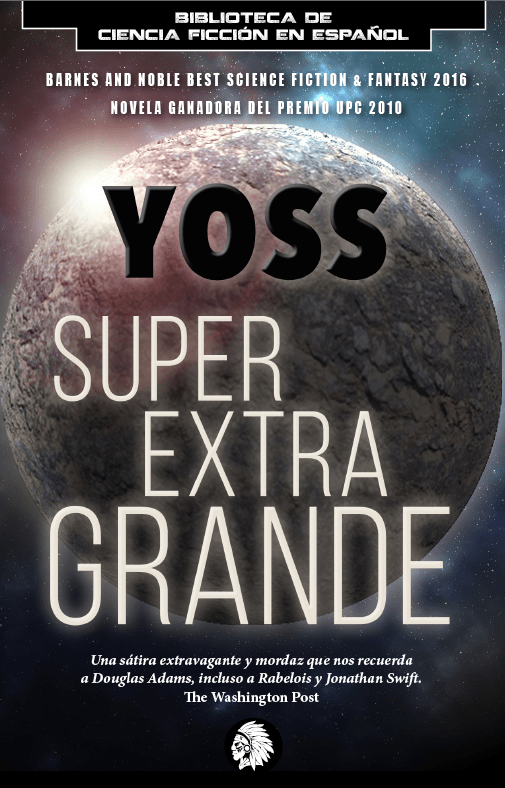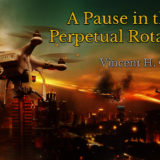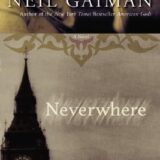 Middle books of a trilogy are the ugly step-child of literature. Everybody loves the first book in a trilogy: the characters are shiny and new and the world is a playground in which to explore. The final book in a trilogy is almost as well loved: we learn the ultimate fate of the characters whose adventures have kept us on the edge of our seats for the previous two books and the fate of the world is finally resolved. But the second book? We have already been introduced to the main characters, so they are not exactly new, and the story cannot be resolved because that is what the third book is for. In that sense, it is often the most difficult book in a trilogy to write.
Middle books of a trilogy are the ugly step-child of literature. Everybody loves the first book in a trilogy: the characters are shiny and new and the world is a playground in which to explore. The final book in a trilogy is almost as well loved: we learn the ultimate fate of the characters whose adventures have kept us on the edge of our seats for the previous two books and the fate of the world is finally resolved. But the second book? We have already been introduced to the main characters, so they are not exactly new, and the story cannot be resolved because that is what the third book is for. In that sense, it is often the most difficult book in a trilogy to write.
The Naked World, the middle book of Eli P. K. William’s Jubilee Cycle trilogy, does its best to avoid these problems, and succeeds more often than not.
When last we left Amon Kenzaki, he had voluntarily cash crashed, which, while cutting him off from New Tokyo’s economy, allowed him to keep the tech in his body that connected him to the world’s information networks. With no money, he cannot afford to access those networks, but the fact that he still has the tech in him gives him the hope that he will be able to reconnect to them in the future.
After a brief period of adjustment (his senses not being used to apprehending the world without their technological filters), Amon takes a trip across a Stygian river (complete with dead bodies, the origin of which is explained later in the novel) to what was described in the first book as “the best of all possible slums.” It is here that the bulk of The Naked World is set.
This is a clever move for a second book: because it is set in a new place with mostly new characters, there is a lot of the feeling of discovery that came with the first book, Cash Crash Jubilee. At the same time, the new setting exists in symbiosis with the setting of the first book, tightly connecting the two volumes. In a similar way, the dangers and conflicts of the new setting are different from those of the original one, but they continue the journey of the hero of the first novel in a single narrative trajectory.
Within the structure of his adventure story, William has embedded some trenchant critiques of capitalism. The people on other side of the river are necessary to breed citizens for New Tokyo; there has to be a large number of them to ensure genetic diversity, but such a large underclass could threaten the entire system. To ensure that revolution is not a possibility, people in the slum have self-selected into conflicting tribes and the infrastructure is falling apart (literally: it is built of a substance that has a short best before date). Citizens are too busy trying to survive to challenge the system.
How do the citizens of New Tokyo live with the fact that their existence requires the brutal exploitation of so many other people? The myth of “the best of all possible slums,” of course. In addition to videos which selectively portray the slums in a more positive light, charities run tours of the slum to allow New Tokyo residents to see them for themselves: From what he had observed of the buses coming and going over the hour or so they’d been perched here, none of them unloaded their tourists more than a couple hundred meters from the resort – the glass cylinder of which poked above the roofscape just a hundred meters south – and Amon wondered why they didn’t just walk. Perhaps the ostensible reason was to ensure safety, though residents of privileged communities near Delivery like this one were not nearly so desperate as to harm bankliving, especially not with the Carebots poised ready to swoop in and offer protection for a fee to any bankliving confronted by someone without a BodyBank. More likely, the tour operators wanted to control what the participants saw, for going any deeper would introduce them to conditions more representative of the camps at large, and make their claims for the positive impact of donations less persuasive.” (251)
As William observes, “The trick to running a successful humanitarian operation is to appear to be constantly alleviating poverty without solving any of its underlying causes and ensuring that no one else does either.” (309)
In The Naked World, the author also makes the case for books, especially literary fiction. Amon, who has lived his entire adult life in an environment of hyper-digital stimulation, cannot, at first, read any of the words of the books in the library that is an important setting in the novel. Over its course, his brain is slowly able to make sense of them. When, at last, he is able to read more or less well, he comes to this conclusion about books: “Plenty, it seemed, had flooded his mind with a great torrent that drowned out the significance of each drop, the constant effort to find signal amid all the noise numbing him to the importance of deeper content while reducing media consumption to an unconscious and automatic cost-benefit metric, a frantic scramble for that which provided the most concentrated jolt of truthiness and entertainment in the shortest span of time. Everything else had to be dismissed as banal, irrelevant, cognitively toxic. A mind so attuned, he now understood, could never grasp the pleasure of literature, with its gradual accumulation of polysemic complexity and ambiguity that took hours, days, and sometimes weeks to culminate.” (377)
The Naked World isn’t perfect. I must admit, for instance, that I prefer the whiz bang, anything is possible virtual world portrayed in Cash Crash Jubilee; the more banal real world of the sequel didn’t grab me quite as much. This is, of course, just a personal preference.
On the other hand, William has a tendency to put Amon in peril that the character cannot get out of himself, forcing him to rely on others to rescue him. This happened towards the end of the first book, when the woman he loved had to bail him out when he was on the edge of bankruptcy. It happens again at the beginning of this book, when, deaf and blind, a stranger has to help Amon survive in New Tokyo long enough for his sense to start working. As understandable as it is in the working out of the story, this violates the principle of agency, the idea that the hero must be the person who overcomes the obstacles put in their path.
These quibbles aside, The Naked World is a worthy second novel in a trilogy, and made me eager to read the final book.











“But the second book?”
Yea, the second Hunger Games book really lucked out – having both Catching Fire books released at the same time wasn’t planned (https://imponderabilia.blogspot.com/2009/05/catching-fire.html) but it made the Hunger Games one that much funnier. 😉